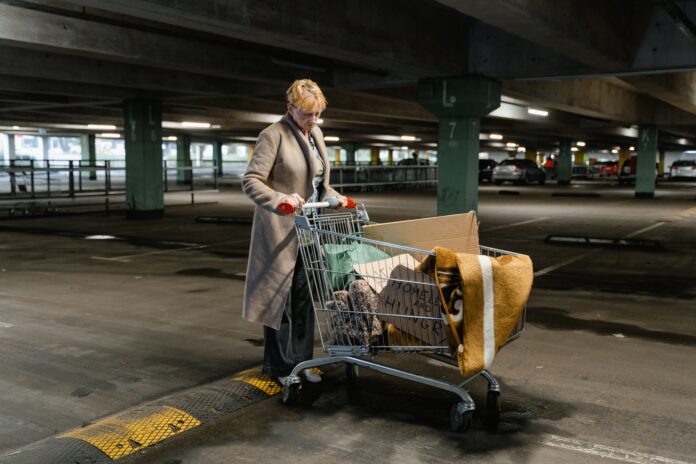
Four out of 10 employers admit they would likely seek to terminate an employee’s contract if they were homeless
- Draining, frightened, judged: Harrowing new report uncovers the inhuman reality of what it is like to be homeless and working in 21st century Britain
- Back pain, anxiety and exhaustion: Robbie from Gwynedd describes ‘working from home’ whilst sofa surfing
- The new insight comes as Crisis prepares to open its Christmas services for the 50th time
A staggering four out of 10 employers (42%) from across the UK have admitted they would likely seek to terminate an employees’ contract if they were homeless, an eye-opening new report by Crisis, which launches today, reveals.
The report draws on a survey of 250 UK employers, new analysis of UK government homelessness data and in-depth interviews with people from across Great Britain who have experienced being in-work and homeless in the last two years.
It comes after the recent Homelessness Monitor report from Heriot-Watt University found that 21 out of 22 Welsh local authorities expected to see a rise in homelessness as restrictions on evictions are lifted. During the pandemic the Welsh Government invested an extra £4.1m into Discretionary Housing Payment funding, with many households under increased financial pressure. 20 out of 22 councils said the extra funding has been important in preventing and reducing homelessness.
The new report out today exposes the tremendous strain working and being homeless has on a person’s wellbeing, how it damages people’s chances of creating meaningful connections with colleagues and how staff are reluctant to turn to their employer for support out of fear of losing their job. The research also reveals how poorly paid, insecure work is leaving people trapped in homelessness. It shows that in England alone, one in four households facing homelessness are in work.
Through first-hand accounts, participants revealed how experiencing homelessness while working had a hugely detrimental impact on their physical, mental and emotional wellbeing which was exacerbated by the constant struggle of trying to keep their homelessness a secret and made daily activities like eating, sleeping and washing extremely difficult to manage.
Participants described how they were frequently left anxious and exhausted when at work due to the mental toll of trying to find somewhere to sleep night after night, with many forced to bed down in vehicles, on floors or in tents, before having to travel long distances to get to work with very limited transport options besides walking.
Many saw their hygiene suffer as they struggled to wash themselves and their clothes, often turning to gyms or the generosity of friends to access showers, with one participant recalling how they had to resort to washing in train toilets. [See notes to editor for case study quotes.]
Sadly, the isolation of working without a home was also revealed, with most participants choosing not to tell their boss as they felt nothing good would come from it but also from the shame of how they would be perceived. This resulted in many participants taking steps to conceal their situation by using friends or family members addresses for admin and avoiding situations where their homelessness could be uncovered, leaving them cut off emotionally from their peers.
While there were instances of companies providing support to their employers either via time off or loans to find a home, disturbingly several participants reported being let go when their situation came to light with little to no reasoning, other than their situation made their employment untenable.
The survey findings reflect why workers were right to be concerned with over half (56%) of employers stating homelessness would likely have a detrimental effect on a current employee’s job, while a further 58% disclosed how being homeless would likely have a negative impact on a prospective employee’s application, suggesting that negative attitudes to homelessness is a major issue amongst UK businesses.
The research also drilled down into the reasons why workers are locked in a cycle of homelessness with no end in sight. A key driver for most was the sheer lack of affordable housing and rapidly increasing living costs which is putting further pressure on already strained budgets and leaving many fearing how they will cover rent, bills and other necessities like heating and food. The low paid and often insecure nature of their work also meant that in many cases private landlords were reluctant to rent to them leaving them with little hope of finding a home.
Robbie from Gwynedd works in communications for an energy company. He had to start sofa surfing after a relationship breakdown earlier this year.
He said: “I got horrible back pain sofa surfing – both from sleeping and working. My company doesn’t have an office. I tried working from the sofa but it ended up being less painful to sit on the floor with my back against it for support. Some days it stressed me out too much, so colleagues let me work at their houses. I don’t drive though and only had a desktop tower PC, so carrying it was exhausting. I’d regularly be lugging it around for hours a day.
“The whole situation hit my mental health hard but my boss was really understanding and gave me time off. I really appreciated her looking out for me. She also helped me find the place I’m living now – a cabin on a farm. It’s really a glorified shed with no running water and terrible internet. I’m constantly trying to find something better, but I just can’t find anything I can afford in my local villages.”
This shocking insight comes as Crisis prepares to open it’s Christmas services across Great Britain for the 50th time. Its Skylight South Wales centre will be delivering hot meals, hampers and wellbeing calls to people experiencing homelessness in the region between Christmas and New Year, which can often be a particularly isolating time with many services closed. It will also be helping people access its year-round services, to help end their homelessness for good.
Commenting on the research Crisis Chief Executive, Jon Sparkes, said: “It should shame us all that this Christmas tens of thousands of people – many of whom kept us safe during the pandemic by delivering our packages, stocking our food shelves and teaching our children – are being forced to hunker down in vans or sleep in freezing tents because they cannot afford a roof over their head.
“For too long now, insecure poorly paid jobs combined with spiralling housing costs have been putting untold pressure on people up and down this country. We need to ensure that work can provide a reliable route out of poverty, otherwise this will continue to be an inhuman and devastating reality for many.
“It is crucial that everyone plays their part in tackling homelessness, and this includes businesses and employers providing the right support to staff when they fall on hard times. We also need to get to grips with the root causes that are pushing people to the brink. The Welsh Government has already committed to seriously increasing supply of social homes but we also need the UK government to unfreeze housing benefit, so people can afford to pay their rent.
“Until we tackle this for good, Crisis will continue to be there for the people that need us – providing a safe place to stay, companionship, food and support – and hope for a future away from homelessness.”
People can support Crisis this Christmas by donating £29.06 which will provide people experiencing homelessness with a life changing gift of somewhere safe to stay, food, friendship, care and advice. Please visit: www.crisis.org.uk/support
Quote from Greg Mangham, founder and CEO of Only A Pavement Away, said that “the big thing employers have to learn is empathy and this can be as simple as making sure a person knows how to get to work, what travel they have to take and ensuring they are confident in doing the role. Stability comes through regular employment. The attitude of ending contracts due to homelessness is draconian and people should realise it’s easy to have a job today and be homeless tomorrow.”

| [donate]
| Help keep news FREE for our readersSupporting your local community newspaper/online news outlet is crucial now more than ever. If you believe in independent journalism,then consider making a valuable contribution by making a one-time or monthly donation. We operate in rural areas where providing unbiased news can be challenging. |



















